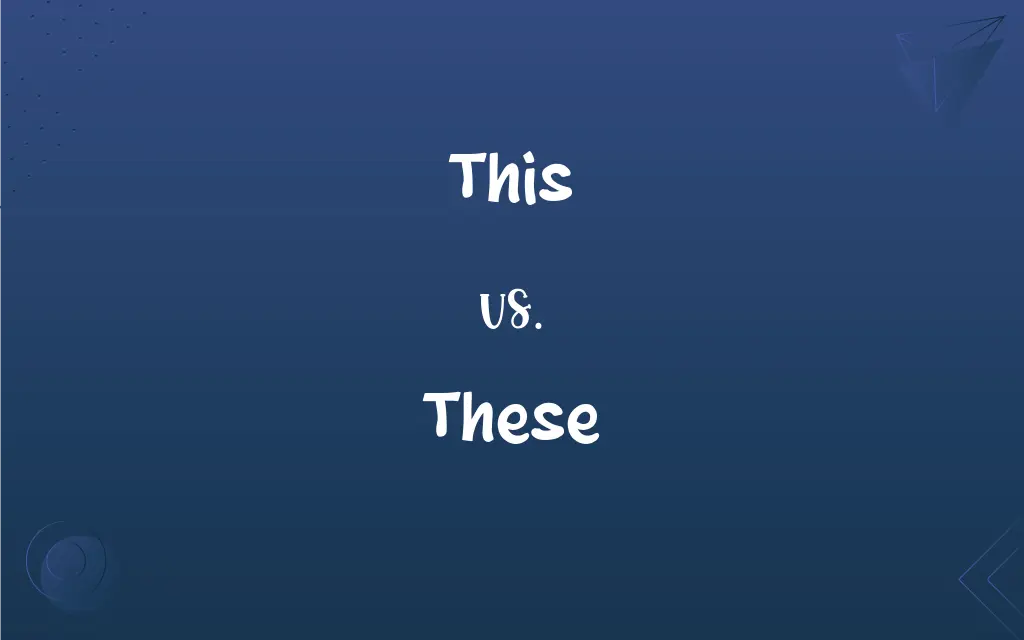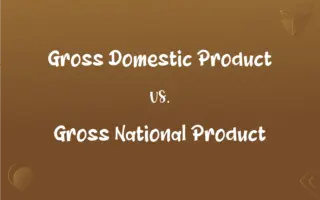This vs. These: What's the Difference?
Edited by Aimie Carlson || By Janet White || Published on November 16, 2023
"This" refers to a singular noun nearby or being experienced, while "These" is its plural counterpart.

Key Differences
"This" is a demonstrative pronoun used to identify a specific singular noun that is usually physically close or is figuratively important in context, while "These" performs a similar function but is used for plural nouns.
"This" is also used to introduce someone or something, as in "This is my friend," whereas "These" introduces or refers to multiple people or objects, as in "These are my friends."
In a temporal context, "This" refers to the current event or period, such as "this week," whereas "These" would not typically be used in this manner, as it addresses multiple items or events.
"This" can emphasize the subject in discourse, adding immediacy or relevance, for example, "This is what I need." In contrast, "These" emphasizes the immediacy or relevance of multiple objects, "These are what I need."
"This" can also be used to indicate a preference for one object in a group, as in "I'll take this," while "These" indicates a preference for several objects, as in "I'll take these."
ADVERTISEMENT
Comparison Chart
Number
Singular
Plural
Proximity
Refers to something close in distance/time
Refers to multiple things close in distance/time
Function
Identifies/introduces a singular noun
Identifies/introduces plural nouns
Contextual Usage
Emphasizes immediacy or relevance of one item
Emphasizes immediacy or relevance of multiple items
Preference
Indicates a choice for one item
Indicates a choice for multiple items
ADVERTISEMENT
This and These Definitions
This
Used to introduce a person or thing.
This is Jane, my colleague.
These
Demonstrative pronoun used to indicate specific, plural items near in space, time, or thought.
These are the highest priorities right now.
This
Used to refer to the present time or situation.
This is the moment we've been waiting for.
These
Used to introduce more than one person or thing.
These are my brothers, Frank and Joe.
This
Indicates the next item in a sequence.
After that step, you do this.
These
Refers to a familiar or recurrent situation.
Not these problems again!
This
Refers to something just mentioned or about to be mentioned.
The solution to this is simple.
These
Refers to specific things just mentioned or implied.
These are becoming increasingly difficult to find.
This
Being just mentioned or present in space, time, or thought
She left early this morning.
These
Indicates a group of items physically near the speaker.
These need to be signed before we proceed.
This
Being nearer or more immediate
This side and that side.
These
Plural of this
This
Being about to be stated or described
Just wait till you hear this story.
These
Plural of this
This
(Informal) Used as a substitute for the indefinite article
Looking for this book of recipes.
These
The plural of this. See This.
This
To this extent; so
Never stayed out this late.
This
The (thing) here used in indicating something or someone nearby.
This classroom is where I learned to read and write.
This
The known (thing) used in indicating something or someone just mentioned.
They give the appearance of knowing what they're doing. It's this appearance that lets them get away with so much.
This
The known (thing) used in indicating something or someone about to be mentioned.
When asked what he wanted for his birthday, he gave this reply: “[…]”
This
(informal) A known (thing) used in first mentioning a person or thing that the speaker does not think is known to the audience. Compare with "a certain ...".
I met this woman the other day who's allergic to wheat. I didn't even know that was possible!
There's just this nervous mannerism that Bob has with his hands, and it drives me crazy.
This
(of a time reference) Designates the current or next instance.
It's cold this morning.
I plan to go to London this Friday.
This
To the degree or extent indicated.
I need this much water.
Do we need this many recommendations?
We've already come this far, we can't turn back now.
This
The thing, item, etc. being indicated.
This isn't the item that I ordered.
This
(philosophy) Something being indicated that is here; one of these.
This
(Internet slang) Indicates the speaker's strong approval or agreement with the previous material.
― I wish trolls could be banned from the forum immediately, without any discussion.
― This!
― This!
This
As a demonstrative pronoun, this denotes something that is present or near in place or time, or something just mentioned, or that is just about to be mentioned.
When they heard this, they were pricked in their heart.
But know this, that if the good man of the house had known in what watch the thief would come, he would have watched.
This
As an adjective, this has the same demonstrative force as the pronoun, but is followed by a noun; as, this book; this way to town.
This way and that wavering sails they bend.
A body of this or that denomination is produced.
Their judgment in this we may not, and in that we need not, follow.
Consider the arguments which the author had to write this, or to design the other, before you arraign him.
Thy crimes . . . soon by this or this will end.
This twenty years have I been with thee..
I have not wept this years; but nowMy mother comes afresh into my eyes.
This
Demonstrative pronoun for a singular item, either physical or metaphorical.
This is exactly what I was looking for.
FAQs
Does "This" always precede a noun?
Not always; it can stand alone or precede a noun.
Can "This" and "These" be used interchangeably?
No, "This" is singular, and "These" is plural.
Can "These" refer to items spread over a long period?
Yes, if they're considered part of a collective group.
Can "This" start a sentence?
Yes, often when introducing ideas or items.
Can "These" indicate something in the past?
Generally, it refers to things immediate or present.
Are "This" and "These" used only for objects?
They can refer to objects, people, situations, or periods.
Is "These" used with specific verbs?
It's not tied to specific verbs but to the plurality of the subject.
Can "These" be used in questions?
Yes, like "What are these?"
Can "This" refer to something far away?
Generally, it's used for items close in distance or context.
Are "These" and "Those" the same?
No, "These" is for nearby items; "Those" for farther away.
Is "This" used in formal writing?
Yes, it's standard in both formal and informal contexts.
Can "These" be used without a following noun?
Yes, it can stand alone when the noun is understood.
Does "This" change form in different tenses?
No, "This" remains the same in all tenses.
Can "These" be used for non-countable nouns?
No, "These" is used for countable, plural nouns.
Is "This" a pronoun or an adjective?
It can function as both, depending on usage.
Does "These" imply physical proximity?
Often, but it can also imply figurative proximity.
Is "This" used for emphasis?
It can be used to emphasize the subject in context.
Can "These" be used in negative sentences?
Yes, e.g., "These are not what I expected."
Can "This" refer to an abstract concept?
Yes, it can refer to both tangible and intangible items.
Can "This" refer to a person?
Yes, when introducing or emphasizing.
About Author
Written by
Janet WhiteJanet White has been an esteemed writer and blogger for Difference Wiki. Holding a Master's degree in Science and Medical Journalism from the prestigious Boston University, she has consistently demonstrated her expertise and passion for her field. When she's not immersed in her work, Janet relishes her time exercising, delving into a good book, and cherishing moments with friends and family.
Edited by
Aimie CarlsonAimie Carlson, holding a master's degree in English literature, is a fervent English language enthusiast. She lends her writing talents to Difference Wiki, a prominent website that specializes in comparisons, offering readers insightful analyses that both captivate and inform.































































